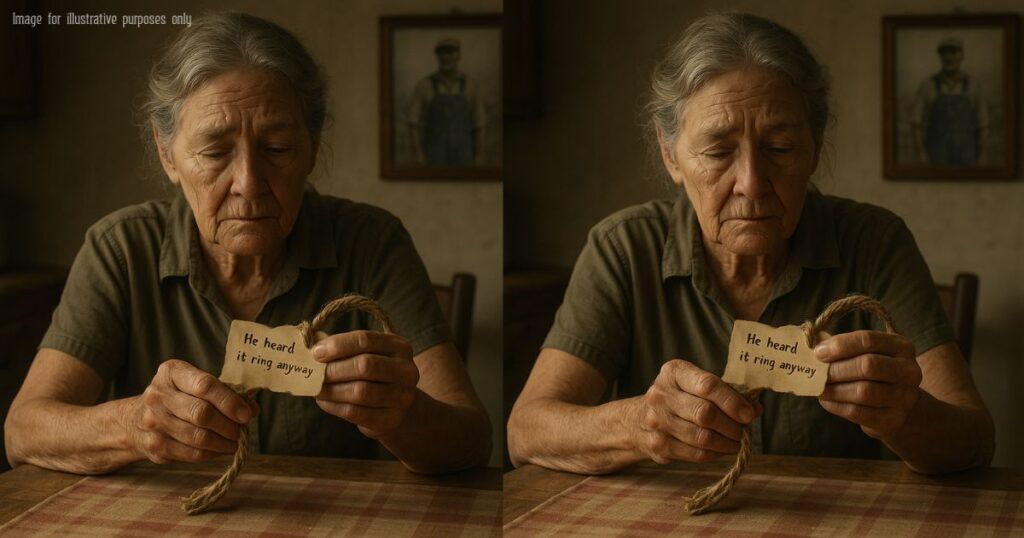Spring turned the fields green again. Not the lush, careless green of youth — but a stubborn, patchy kind. Like hope after grief. It didn’t blanket the land. It worked its way in, one sprig at a time.
Wren stayed. No one came looking, and I didn’t press. I’d left the city behind with just a note on my locker. “Family emergency,” it said. But the truth was simpler: I didn’t want to be a doctor in a building anymore. I wanted to heal something I could touch with my bare hands.
And so, we healed together — me and that girl who arrived in boots too big, ringing a bell that hadn’t been touched in decades.
By May, the henhouse had chicks again. The garden buzzed with bees and sweat and the smell of compost. I taught Wren how to can green beans, how to set fence posts, how to spot blight before it spread.
But she taught me things too. She showed me how to be quiet without feeling alone. How to be still without being unproductive. How to watch things grow without rushing them.
Some mornings I’d find her sitting by the bell, knees hugged to her chest, eyes closed, listening.
“To what?” I asked once.
She opened one eye. “The nothing. It’s loud here, but the good kind.”
One afternoon, a truck pulled up the drive.
An old Ford. Faded red, with a feed store decal peeling off the back bumper.
Out stepped a man I hadn’t seen in twenty years.
Caleb — my middle brother. He used to run the combine like it was an extension of his body. Now he walked with a limp and a face like cracked leather.
“I heard someone rang the bell,” he said.
I nodded.
“You?” he asked.
“No,” I said. “Not this time.”
He followed me around the back. Wren was kneeling in the dirt, transplanting lettuce starts. She looked up, brushed her bangs out of her eyes, and smiled.
Caleb froze. “She yours?”
“Not by blood.”
“But by work,” he said, almost to himself. “By calluses.”
That night, he stayed for supper. We ate cornbread and chicken stew at the old table with one short leg. The lamp flickered like it used to, casting shadows across faces that looked older, but familiar.
Before he left, Caleb put a hand on my shoulder. “You gonna stay out here?”
I looked at Wren, who was rinsing dishes with the same care Mama used to.
“I think I already did,” I said.
The county came by in June. A young woman with a clipboard and a smile that didn’t quite reach her eyes. Someone had filed a report — likely from the city, flagged when Wren used my mailing address at the clinic.
She asked questions. Where Wren slept. What she ate. Whether she was in school.
“She’s learning,” I said. “Just not from a desk.”
Wren stepped forward. “I’m not lost,” she told the woman. “I’m home. I just didn’t know what that meant until now.”
The clipboard lady nodded like she understood, but she didn’t.
Still, she signed the papers. Said she’d check in again.
That was enough.
By August, the corn came in — the tall kind, like Daddy used to grow. Wren carved our initials into the barn door, right below where his once were.
That fall, she took the GED. Passed it first try. I cried when I read the score. Not because I was proud — though I was — but because she handed me the paper and said:
“This doesn’t mean I’m leaving. It just means now I have a choice.”
Winter returned, as it always does. The wind scraped the windows like it had something to say. But inside, the house was warm — not just from the stove, but from presence.
We fixed up the guest room. Painted the walls. Hung photos.
Wren made a sign for the front gate:
“The Bell Farm – Where You Come to Begin Again.”
And that’s what it became.
A place for people with nowhere left. A boy from Montana whose foster homes gave up. A woman widowed too young. A retired mechanic who couldn’t afford rent but could still sharpen blades like a magician.
They all came. And they all learned to rise with the bell.
Now I sit on the porch most mornings, coffee in hand, quilt over my lap. The rope is worn again, like it should be. The bell rings at five.
Not by me.
By a girl who showed up one winter with nothing but silence in her pocket.
A girl who taught me that home isn’t always where you start — but where someone teaches you how to ring the bell again.
And in this house, we ring it loud enough to wake the ghosts — and gentle enough not to scare the new roots.
Because healing sounds like that.
A bell, at dawn, calling you forward.


